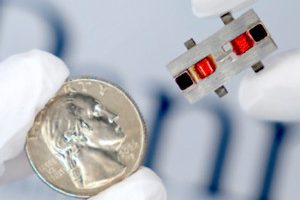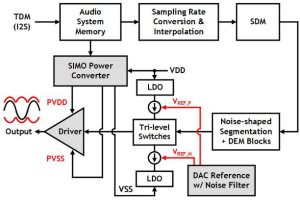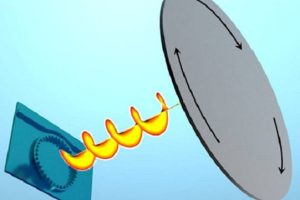
The aim is to reduce radio power consumption by swapping some digital signal processing elements for reconfigurable analogue processing blocks.
“High-speed digitisation blocks targeting microwave frequencies are expensive and consume a lot of power,” said Georgia Tech researcher Nelson Lourenco. “In RF, we can perform processing similar to what can be done in FPGAs, with the idea being that since this is a small integrated circuit, we can put it very close to antennas and integrate it by developing form factor solutions that are very small.”
Dubbed transversal radio frequency filter integrated circuit (TRAFFIC), the technology has been demonstrated a reconfigurable silicon-germanium 10-to-1 analogue finite impulse response (FIR) filter tuneable across 2 to 20GHz.
It is intended to filter-out unwanted high-power or out-of-band signals before they enter the digital signal processing chain to preserve the dynamic range of the incoming signal.
FIR filtering also allows pre-compensation for distortion that occurs when amplifiers operate in saturation.
“TRAFFIC is really about putting more of the functionality closer to the aperture,” said Georgia Tech Advanced Concepts Laboratory director Doug Denison. “Doing that potentially reduces size, weight, power and also cost, while lowering latency through the system and relieving some of the burden on digital components.”
After the front-end filter, the team is looking into an analogue signal conditioner within a self-interference cancelling system.
Analogue conditioning also reduces latency and is continuous-time, removing sampled system bandwidth limitations, according to the university.
The IC was based on a 250GHz, 130nm SiGe BiCMOS platform from GlobalFoundries, exploiting the heterojunction bipolar devices.
Gallium arsenide, gallium nitride or indium phosphide are also mooted for TRAFFIC. “There are certain niche applications where silicon isn’t going to be the best, and TRAFFIC will support those by being technology agnostic,” said researcher Lourenco.
Details were presented at the 2021 IEEE BiCMOS and Compound Semiconductor Integrated Circuits and Technology Symposium.
 Electronics Weekly Electronics Design & Components Tech News
Electronics Weekly Electronics Design & Components Tech News



